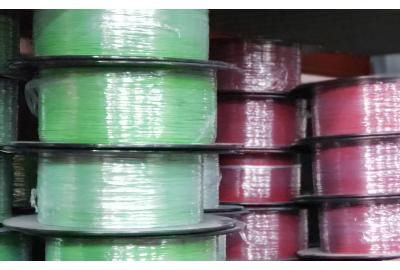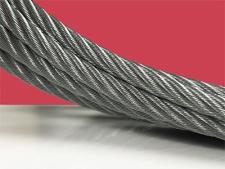Often mechanical cables are coated in igneous plastics, creating what is commonly known as extruded cable. The process of coating cable in plastics is achieved through a sophisticated extrusion process, whereby the cable is fed through the liquefied material until it forms a protective sheath or jacket around the cable.
Depending on the coating material, extruded coated wire provides durability and protection against both environmental elements, such as harsh weather as well as the harmful impacts created when bare cable makes cyclical contact with other metal surfaces.
Common plastic coatings include PVC (polyvinyl chloride), Teflon® FEP, PE (polyethylene), polyurethane (PU) and Nylon (a thermoplastic synthetic polymer).
While mechanical cable engineers use and applications call for a wide variety of coatings, the coating applied to the mechanical cable is determined by the unique demands of each application. In the case of nylon coating, among the most widely used extrusion materials, the plastic’s flexibility, durability and added longevity make nylon coated cable an ideal pairing for a wide variety of use cases.
What is Nylon Coating?
By design, mechanical cables used in push-pull or pull-pull assemblies are put under a significant amount of stress. Typically these cables are in contact with other potentially abrasive materials that, over time, can cause wear and tear. To help keep such mechanical cables durable over sometimes millions of cycles, manufacturers often coat these cables in a thermoplastic nylon, which softens when heated and hardens when cooled. As discussed, such coatings help protect mechanical cables and other metal components from the harmful consequences of metal-to-metal contact, while protecting the cables themselves from harsh, environmental damage.
Nylon coating is among the most popular mechanical cable coating materials because it is known to provide unparalleled cable life. While many cables used in non-mechanical settings are coated in PVC, polyvinyl chloride is quick to delaminate when pushed or pulled through a conduit, making this material less tolerant to harsh conditions than is nylon. Nylon, on the other hand, is incredibly forgiving of abrasion. This means that nylon stays intact during the push-pull process over many cycles, which both increases the overall durability of the cable, and helps shield the cable against variables that can cause wear-and-tear.
What Are the Benefits of Nylon Cable Coating for Mechanical Cables?
There are a variety of benefits to nylon coating. Among the most valued strengths include:
- Abrasion resistance: Without coating, mechanical cables may be subject to metal-on-metal abrasions. Consequently, push-pull actions can cause damage to the cable over repeated cycles. Nylon provides immediate, lasting protection against such abrasive conditions by providing a protective surface layer that keeps the nylon coated wire rope insulated from making direct contact with other assembly or device components.
- Superior protection: PVC, Teflon and other plastics can quickly delaminate when subjected to abrasive mechanical movements, repeated cycling over pulleys or demanding environments. Nylon has been designed to withstand far more cycles under similarly harsh conditions, increasing the life of the cable assembly, as well as other expensive components that comprise the entire product.
- UV protection: UV rays from the sun can cause strength loss, discoloration, and damage to cables and cable coatings. Nylon contains UV inhibitors that allow its use in outdoor applications while limiting damage caused by UV radiation.
- Longevity: Nylon increases cable life significantly, usually by 2 to 3 times its standard lifetime in most cycling applications.
- Coloring: Nylon can also be pigmented for aesthetic or identification purposes. For example, colored nylon-jacketed wire rope can be used to help identification at assembly levels. Colored nylon-coated cable can be used for costume jewelry or other aesthetic purposes.
When to Use Nylon Coating
In general, nylon coating is ideal for most mechanical cables where protecting the cable itself is essential to the application’s requirements. Any time a cable is subjected to a push-pull or pull-pull process, nylon will help protect that cable without risking delaminating the plastic jacket. The flexibility nylon offers makes it ideal for mechanical situations and can contour to mechanical needs.
In addition, lubricant can be inserted between the nylon coating and the cable itself to allow for more fluid movements and give added protection. If the application uses pulleys to route the coated, mechanical cable, nylon is ideal because it will protect the stranded wires from making direct contact with pulleys or other components, which increases the product’s lifespan by reducing overall mechanical frictions. For example, nylon-jacketed aircraft cable is often used for cycling over pulleys and sheaves in flight control systems. Coating the cables in such applications shields the wires from pulleys, thus preventing harsh metal-to-metal contact.
Of course, there are some situations where other coatings may outperform nylon. Among nylon’s biggest drawbacks is that once it reaches 180° Fahrenheit, it begins to deform. If however, your application does not expose the coated cable to greater than moderate temperatures, nylon is tough to top.
Summary
- Mechanical cables used in many applications often use cables coated with plastics where the application calls for an increased longevity and protection against harmful contact with other components.
- Nylon coating is a type of mechanical cable coating that provides longevity, UV protection, abrasion resistance, and color-coding.
- Nylon is ideal for almost all mechanical cable needs, and it's used across numerous industrial applications.
- Lubrication can be placed between the nylon coating and the cable to boost longevity and increase flexibility.
Are you looking for best-in-class custom cabling solutions like nylon coated mechanical cables? Contact us.






